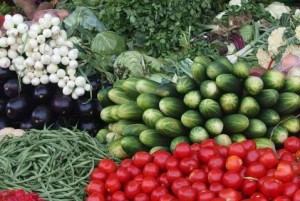Ghana Standards Authority says no cause for alarm over pesticides content in food
 The Ghana Standards Authority (GSA) has given the assurance that there is no cause for alarm over the pesticides contents of locally produced vegetables and fruits.
The Ghana Standards Authority (GSA) has given the assurance that there is no cause for alarm over the pesticides contents of locally produced vegetables and fruits.
Mr Samuel Kofi Frimpong, GSA Senior Standards Officer said research conducted by the authority indicates that the vegetables and fruits does not show an alarming proportions of pesticides in them and therefore, are safe for consumption.
He said although some vegetables and fruits might contain varying levels of pesticides, Ghanaians are free to eat their vegetables and fruits.
Mr Frimpong who is also the GSA Ashanti Regional Head said pesticides have being designed to kill or control pests, but their applications on crops sometimes leaves traces on their surfaces and also in fruits and vegetables, which in high levels could be dangerous for human consumption.
He made the remarks during a public lecture in Accra by the GSA on the topic “The Effect of Pesticides Residues on Food Safety and Public Health,” in Accra.
He observed that exposure to high levels of pesticides could lead to certain type of cancers, reproductive problems and development effects such as memory loss and uncontrolled moods.
He said a research carried out by the GSA on the residual contents of insecticides in fruits and vegetables from Greater Accra, Central, Volta, Eastern and Ashanti; from 2013 to 2014 indicated varying levels of insecticides in them.
In the Greater Accra Region, out of 23 samples analysed, two (nine per cent) did not contain insecticides, 15 (65 per cent) contained insecticides; which were below the maximum residual limits (MRLs), while six (26 per cent) contained samples above the MRLs.
The research findings show that for the Central Region, three samples were analysed of which there were no samples of insecticide residues detected.
In the Volta Region eight samples were studied, of which one (12.5 per cent) did not contain samples of insecticide residues; whereas the remaining seven (87.5 per cent) contained samples of insecticides residues below the MRLs.
Of the 13 samples from the Eastern Region analysed, 11 (86 per cent) contained samples below the MRLs, whilst two (14 per cent) had samples above the MRLs.
Out of the 23 samples analysed from the Ashanti Region, 10 (43 per cent) had no insecticides in them, with 11 (48 per cent) containing samples of insecticides residues below the MRLs, whereas two (nine per cent) had insecticides contents above the MRLs.
On recommendations to reduce potential exposure to pesticide residues in food, Mr Frimpong urged the public to choose a variety of foods rather than a diet centered on only a small number of foods.
He said surface cleaning would not remove pesticide residues taken up by the growing plant, but it would take away residues on the surface as well as any in dirt on the product.
Mr Frimpong said trimming of the fat from meat and poultry and discarding the fat in broths and pan drippings, would eliminate most pesticide residues that might concentrate in the fat.
He advised the public to avoid fish and game from areas where pesticides had been misused or areas that were known to be contaminated.
He said however, the best and sure way to avoid pesticide residues in food is to follow good agricultural and food safety procedures.
Mrs Ernestina Adeenze, GSA Senior Standards Officer said the Pesticide Residue Laboratory of the GSA had been well equipped to conduct both quality control and residue tests up to the international standards.
Mr Clifford Frimpong, Head, GSA Food Laboratory noted that a pesticide like organochlorine is being imported into the country for controlling cotton pesticides.
He however, cautioned vegetable and fruit farmers against its usage, since it has serious health repercussions when taken in through the food chain.
It could be recalled that the Ministry of Food and Agriculture last month placed a temporary ban on exports of some vegetables to the European Union market; until all issues on interceptions by the Food and Vegetable Office of the European Commission are addressed.
The affected vegetables include Capsicum, Solanum species- Aubergines, Momordica, Luffa and Lagenaria (gourd family) which accordingly have undesired consequences for the country’s export vegetable sector.
The World Health Organisation estimates that there are three million cases of pesticide poisoning each year and up to 220,000 deaths, primarily in developing countries.
Source: GNA
